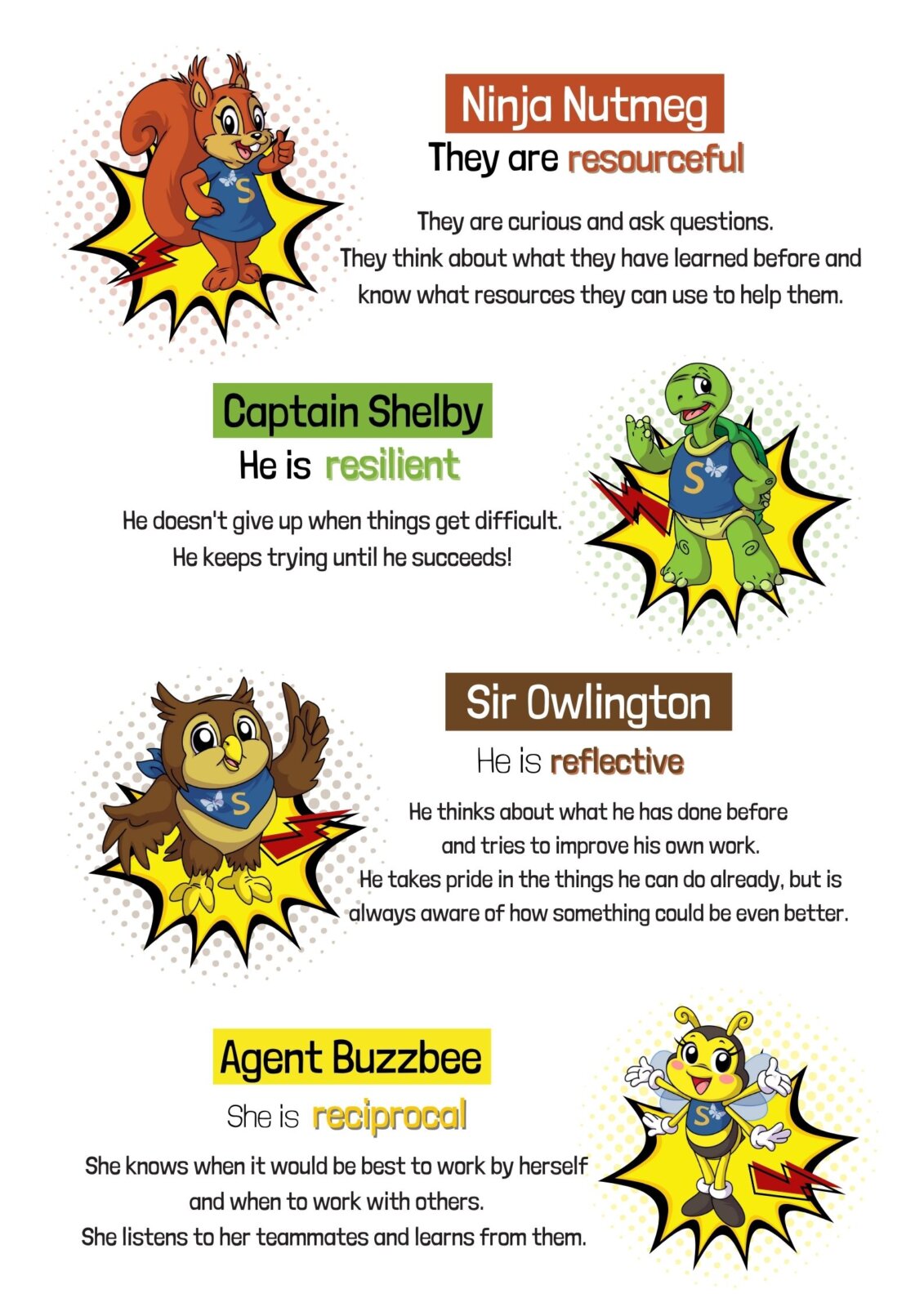Helping young people become better learners
At Southill, we are on a very exciting quest to help our children become better learners. As teachers, we can’t possibly teach children everything they need to know to be ready for the world by the time they leave us. But we can inspire within them a love for learning which will remain with them throughout their lives. We believe that, by teaching children how to solve problems and by encouraging them to persevere in the face of challenges, they will develop ‘learning powers’ which can then be applied to whatever skills or knowledge they choose to acquire in their adult lives. We are teaching children how to learn so that they are ready to choose the ‘what to learn’ part for themselves!
We believe there are four key attributes of independent, successful learners. With the children’s help we came up with fun, colourful characters to represent these characteristics and to help the children understand them better.

Building Learning Power and a Growth Mindset
Learning is an end in itself. Effort and trying our hardest is an end in itself and something that we believe deserves praise and recognition. So, our weekly stars assemblies celebrate those times during the week when a child has been spotted really persevering with something they find difficult, at whatever level they may be.
Learning is never ‘finished’ and our brains are never ‘fully-grown.’ The amazing thing about learning is that there is always more of it to do, no matter how good at something we already feel. BLP is about saying to ourselves ‘I can do that now. So, what’s next? How can I use this new skill that I have mastered to help me build new skills in other areas? How, even, could I help someone who is struggling to reach my own level of understanding?’
Teaching and support staff embed this type of language daily into their conversations with children. And we are all noticing a huge difference in children’s resilience and open-mindedness in the face of challenges.
We are all of us learning new things and facing challenges every day, both adults and children. Our learning powers help us to make the most of these challenges and learn from them.
So how exactly are these learning powers developed at school?
The way BLP is discussed with children develops as they progress through the school however the thought processes and learning strategies are similar from one year group to the next. Here are some examples of what BLP ‘looks and sounds like’ at school:
- Children organising themselves each morning by putting their book bag, water bottle, lunch box, etc. in the correct places by themselves.
- Reminders to look around their learning environment for ideas and visual aids when writing or working through a calculation. Teaching staff always ensure that the learning environments reflect the skills being taught at any one time.
- Sharing ideas with friends during carpet time and also in group work; exploring all possibilities together and learning how to build on one another’s ideas.
- Discovering that there is often no ‘wrong answer,’ even in maths. Many questions from staff follow a format of ‘how could we work this out?’ or ‘what do we know already that could help is with this problem?’ which allows children to explore lots of possibilities as a team.
- Teaching staff making sure that learning apparatus (from sound mats to dictionaries and counting cubes to multiplication grids) are accessible for pupils to find as and when they need them; a culture in which children take charge of their own learning is maintained.
- Effort is valued and praised above attainment because persevering and facing difficulties is a skill in itself. Even the most knowledgeable and able children can progress by constantly building upon previous understanding.
- Mistakes are good! They direct us to find other ways around a challenge and to make discoveries.
- Children who have confidently grasped a concept are challenged to explain this to someone who may be struggling; children can learn so much from each other and it’s brilliant when we can support each other in our learning.
How can you help to develop these learning powers at home?
The questions we ask children is key because through questioning we are opening up discussion and encouraging children to think for themselves. Here are some examples of how you can question things in a ‘BLP way’ which are applicable to a range of scenarios:
What could you use to help you find the answer?
What do you know already that might give you some clues?
Our first try didn’t work. That’s OK, we’ll learn from that. How else could we try it?
We are going to be resilient and accept that learning is always tough, for everyone, even people who make it look easy.
Can you explain to me how you worked that out?
How would you explain that to someone who didn’t understand?
What made you choose to do it this way instead of that way?
It is important that children regard their learning powers as useful to all areas of life and not just maths and literacy. For example, sometimes we need to be resilient and flexible if a game with friends doesn’t go the way we planned; we need to accept that we won’t become a famous dancer overnight but that there will be lots of steps and challenges along the way; other people may have different ideas for how to approach a task and therefore it’s important that we think carefully about everyone’s ideas.
At Southill, we think BLP is really exciting and the children are real experts about the learning powers that they each posses. We hope you are equally as excited about the concept of lifelong learning and keen to encourage a love for discovering new things about the world and ourselves as we are.
If you’d like to find out more, please speak to any of our teachers.
Happy learning, everyone!



